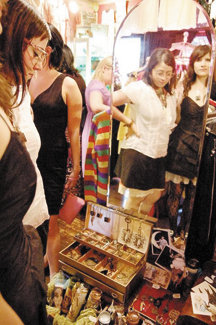To say the creations of the two-woman team called “Rubella” are new would be a distortion, since what they use to create their brand of jewelry comes out of the historic past, antiques of bygone eras used in innovative ways.
Even the name is something recycled, a song title from the Smoking Popes’ song from the 1990s. Rubella, also a name for the German measles, is the alias of two gifted designers: Rita Salpietro, of Jersey City and Samantha Stillwagon of Bayonne.
The pair met in college and found they had a common interest in photography and antiques.
As Rubella, they make custom handmade jewelry featuring antique tintype photographs, chandelier crystals, skeleton keys, animal bones, human teeth, and other anatomical objects. All of the objects come from the past, but are often put together in uniquely modern ways, and every piece is different.
“We were obsessed with it in school and always collected things, and then we started making jewelry for ourselves.” – Samantha Stillwagon
________
“We were both photography majors in college,” Stillwagon said.
There was magic almost from the moment they met, when they discovered they both were drawn to the Victorian Era – a period that is considered to run from the American Civil War to the start of World War I.
“We were obsessed with it in school and always collected things, and then we started making jewelry for ourselves,” she said. “We made jewelry to wear, and then other people starting asking about where we got them, and wanted to know if we could make things for them. So we did.”
Both women were also drawn to the old cards used in freak shows for slide show presentations, an early version of the filmstrips that would later take their place.
One of the items likely to become their signature piece is called a tintype, which is an antique method of printing a photograph directly onto metal. These can often be seen on old graves with photographs of the deceased. Jewelry bearing images of deceased strangers creates a kind of celebration of otherwise forgotten lives. Stillwagon said there is something special in wearing a piece from the past.
Based in Hudson County, selling in Brooklyn
Based in Bayonne and Jersey City, their creations can be found at select shops around the area and occasionally on the road at various craft fairs and shows, and have recently gone on permanent display in a shop in Brooklyn.
When something isn’t old, the two artists do their best to make it seem old, embellishing candles from the supermarket with images from the late 1800s.
Stillwell said creating the jewelry gives a three-dimensional element to their photographic art.
“We also use things that are not traditionally worn,” she said. “We make things out of furniture, such as old handles, each with an obvious sense of history.”
The two women sell a lot of their work at craft fairs, or on the internet.
But this month, they became members of a cooperative, and will have their work permanently on display at the Urban Alchemist in Park Slope, Brooklyn.
They collect their raw materials from a number of sources: antique shows, yard sales and the like.
Prices for their jewelry range from about $30 to $80, at least for now, she said.
“We pretty much start making something as soon as we find it, trying to pair it with something else,” Stillwell said. “We are working pretty much all the time.”
The two women hope to build a fan base and go to even more fairs and events, but it is important that each piece be “one of a kind.”
Al Sullivan may be reached at asullivan@hudsonreporter.com.
